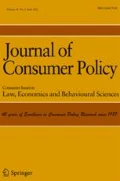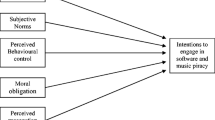Abstract
This article presents the results of an experiment in which three different types of anti-piracy arguments were tested among 139 young adult consumers susceptible to engage in swapping music over the Internet: (1) stressing the negative personal consequences of pirating music, (2) stressing the negative consequences for the artists, and (3) stressing the unethical nature of this behaviour. The psychological determinants of music piracy behaviour were modeled in part with (1991) Ajzen’s theory of planned behaviour. The results show that the intention to swap music on-line depended on one’s attitude toward music piracy, one’s perception that important others want that this behaviour be performed, and one’s perceived competency in doing so. In addition, having swapped music on-line in the past had a strong influence on one’s intention to do it again. Contrary to expectations, the anti-piracy arguments had no significant impact on the behavioural dynamics underlying on-line music piracy.
Similar content being viewed by others
References
I. Ajzen (1991) ArticleTitleThe theory of planned behavior Organizational Behavior and Human Decision Processes 50 179–211 Occurrence Handle10.1016/0749-5978(91)90020-T
I. Ajzen (2002) Constructing a TpB questionnaire: Conceptual and methodological considerations University of Massachussetts Amherst. MA
I. Ajzen B. L. Driver (1992) ArticleTitleApplication of the theory of planned behavior to leisure choice Journal of Leisure Sciences 24 204–224
R. M. Baron D. A. Kenny (1986) ArticleTitleThe moderator-mediator variable distinction in social psychological research: Conceptual, strategic, and statistical considerations Journal of Personality and Social Psychology 61 1173–1182
BBC News (2004). Web music piracy fight “working” (http://news.bbc.co.uk/1/hi/entertainment/music/3419735.stm)
L. Beck I. Ajzen (1991) ArticleTitlePredicting dishonest actions using the theory of planned behaviour Journal of Research in Personality 25 283–301 Occurrence Handle10.1016/0092-6566(91)90021-H
D. J. Bem (1972) Self-perception theory L. Berkowitz (Eds) Advances in Experimental Social Psychology NumberInSeriesVol 6 Academic Press San Diego, CA 1–62
P. M. Bentler G. Speckart (1979) ArticleTitleModels of attitude-behavior relations Psychological Review 86 452–464 Occurrence Handle10.1037//0033-295X.86.5.452
S. Bhattacharjee R. D. Gopal G. L. Sanders (2003) ArticleTitleDigital music and online sharing: Software piracy 2.0? Communications of the ACM 46 107–111 Occurrence Handle10.1145/792704.792707
Bridis, T. (2004). Record industry sues more downloaders. The Sun Herald, January 22 (http://www.sunherald.com/mld/sunherald/business/7766838.htm)
H. K. Cheng R. R. Sims H. Teegen (1997) ArticleTitleTo purchase or to pirate software: An empirical study Journal of Management Information Systems 13 49–60
M. A. Clee R. A. Wicklund (1980) ArticleTitleConsumer behavior and psychological reactance Journal of Consumer Research 6 389–405 Occurrence Handle10.1086/208782
Colbert, F., Tomiuk, M.-A., Hwang, H., & Ménard, M. (2003). An investigation into the effects of Napster’s demise on the purchase of music CD’s. Proceedings of the 7th International Conference on Arts and Cultural Management. Milan, Italy: Università Commerciale Luigi Bocconi (electronic document)
A. H. Eagly S. Chaiken (1993) The psychology of attitudes Harcourt Brace Jovanovich Fort Worth, TX
R. East (1993) ArticleTitleInvestment decisions and the theory of planned behaviour Journal of Economic Psychology 14 337–375 Occurrence Handle10.1016/0167-4870(93)90006-7
M. Fishbein I. Ajzen (1975) Belief, attitude, intention, and behavior: An introduction to theory and research Addison-Wesley Reading, MA
Gopal, R. D., Sanders, G. L., Bhattacharjee, S., Agrawal, M., & Wagner, S. C. (forthcoming). A behavioral model of digital music piracy. Journal of Organizational Computing and Electronic Commerce
International Federation of the Phonographic Industry (2004). Fact sheets – Internet piracy (http://www.ifpi.org/site-content/press/20040330c.html)
G. F. Keppel T. D. Wickens (2004) Design and analysis: A researcher’s handbook EditionNumber4th ed. Prentice-Hall Upper Saddle River, NJ
Kwong, T. C. H., & Lee, M. K. O. (2002). Behavioral intention model for the exchange mode Internet music piracy. Proceedings of the 35th Annual Hawaii International Conference on System Sciences, Computer Society (electronic document)
R. G. Netemeyer W. O. Bearden S. Sharma (2003) Scaling procedures: Issues and applications Sage Thousand Oaks, CA
A. G. Peace D. F. Galletta J. Y. L. Thong (2003) ArticleTitleSoftware piracy in the workplace: A model and empirical test Journal of Information Systems 20 153–177
PEW/Internet (2005). Music and video downloading moves beyond P2P (http://www.pewinternet.org/PPF/r/153/report_display.asp)
R. R. Sims H. K. Cheng H. Teegen (1996) ArticleTitleToward a profile of student software piraters Journal of Business Ethics 15 839–849 Occurrence Handle10.1007/BF00381852
B. Tan (2002) ArticleTitleUnderstanding consumer ethical decision making with respect to purchase of pirated software Journal of Consumer Marketing 19 96–111 Occurrence Handle10.1108/07363760210420531
M. Tonglet (2001) ArticleTitleConsumer misbehaviour: An exploratory study of shoplifting Journal of Consumer Behavior 1 336–354
S. C. Wagner G. L. Sanders (2001) ArticleTitleConsiderations in ethical decision-making and software piracy Journal of Business Ethics 29 161–167 Occurrence Handle10.1023/A:1006415514200
G. Walsh V.W. Mitchell T. Frenzel K.P. Wiedmann (2003) ArticleTitleInternet-induced changes in consumer music procurement behavior: A German perspective Marketing, Intelligence and Planning 21 305–317
Author information
Authors and Affiliations
Corresponding author
Rights and permissions
About this article
Cite this article
d’Astous, A., Colbert, F. & Montpetit, D. Music Piracy on the Web – How Effective are Anti-Piracy Arguments? Evidence from the Theory of Planned Behaviour. J Consum Policy 28, 289–310 (2005). https://doi.org/10.1007/s10603-005-8489-5
Issue Date:
DOI: https://doi.org/10.1007/s10603-005-8489-5




